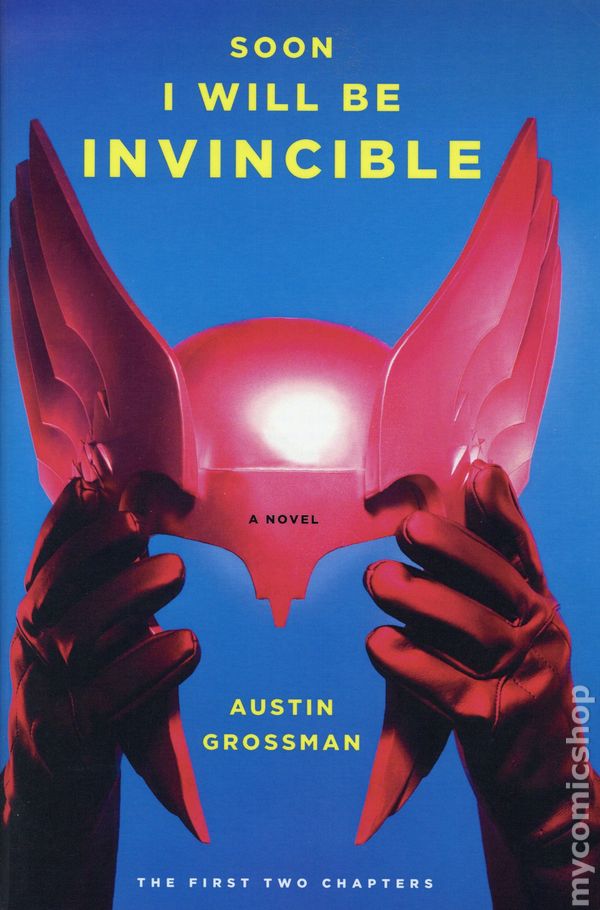Book Review: Soon I Will Be Invincible by Austin Grossman
There are two narrators for this story, neither of whom has all the pieces. The first is Doctor Impossible, a supervillain and mad scientist who has a compulsion to take over the world. The other is Fatale, a cyborg who used to work for the government, but now is being invited to join a superhero group. Doctor Impossible starts the story in prison for the thirteenth time, under what would normally be considered inhumane conditions but are necessary for him not to be able to build a device to break himself out. When he learns that his archenemy CoreFire has gone missing, Doctor Impossible realizes this is his big chance.

The disappearance of CoreFire also triggers Fatale’s involvement in the plot, though at first she has no reason to think there’s a personal connection. The superhero group known as the Champions had broken up some years before, but with Earth’s mightiest hero gone, they’ve decided to get back together with some new faces as the New Champions, and Fatale’s on their short list.
Very quickly, two rookie heroes try to interrogate Doctor Impossible about what he’s done with CoreFire (as the hero’s archnemesis, he is the top suspect) which gives the villain the break he needs to escape prison. Now the New Champions must continue their search for the missing hero, and try to figure out the villain’s master plan in time to stop it. Of course Doctor Impossible himself needs to figure out all the pieces he needs for his new plan, and worry that CoreFire might somehow still be able to thwart him.
This 2007 novel parodies and homages the messiness of shared universe superhero comic books. Characters’ origin stories are improbable or have holes in them, and some of those origins may be lies or universal retcons. Interactions that are life-changing and important to one character are completely forgotten by the other characters in those interactions. Time travel, aliens, and magic exist but are irrelevant to most people’s lives. Heck, some people still don’t believe in magic even if they work with a wizard!
Doctor Impossible comes off as somewhat sympathetic in his own narration. He tries so very hard, and is aware that his goals are in the long run not actually worth it, but may have a mental disorder that forces him to repeatedly strive for world domination. (“Malign Hypercognitive Disorder” may be a real thing, or he might just have a mundane mental illness.) By the end of the story, however, he hasn’t really learned anything, and we see that he’s blinded himself to human contacts that could make his life better.
Fatale, on the other hand, is a bit harder to warm up to. Parts of her brain and memories went missing in the accident that qualified her to become a cyborg, so she’s already feeling disconnected. Then the secret program that gave her cybernetic parts turned out to be fake (in the sense that the agency it supposedly worked for had no knowledge that the program actually existed and didn’t authorize it, it was in fact a villain plot that got dropped halfway through.) Plus working as a cyborg enforcer for the government exposed her to the icky side of humanity. So she’s very cynical and mostly sees the dysfunctions in her new temporary teammates.
The standout character who isn’t a narrator is Lily, the crystal woman from a dark future who has worked both as villain (and is the closest thing Doctor Impossible ever had to a girlfriend) and hero (as with the New Champions.) She’s got some secrets of her own, and is essential to how the climax turns out.
One thing the book does very well is humanizing these superhuman characters. They have hopes and flaws, blind spots and ideals. It’s pointed out that having superpowers can also be like having a chronic medical condition. (Doctor Impossible has low-level superstrength and breaks things when he isn’t careful, and he’s one of the relatively lucky ones.)
When this book came out, it was very well received by the superhero subgenre fandom, not just because of the competent writing, but also at the time there was a dearth of good superhero subgenre prose being published. Since then, it’s gotten somewhat drowned out by the Marvel juggernaut starting with Iron Man in 2008, especially since the book got no sequel or adaptation. And there have been other interesting novels in the subgenre since.
Content note: superhero violence, a bit of it lethal. Some ableism, a bit of cussing. Extramarital sex is discussed. Bullying and homophobia in the backstory. While this is certainly readable by bright teenagers, the concerns and general tone mark this as a book for college age and up.
Competently written and not totally cynical and grimdark, I would recommend this book to superhero fans who are okay with visualizing everything from prose.

